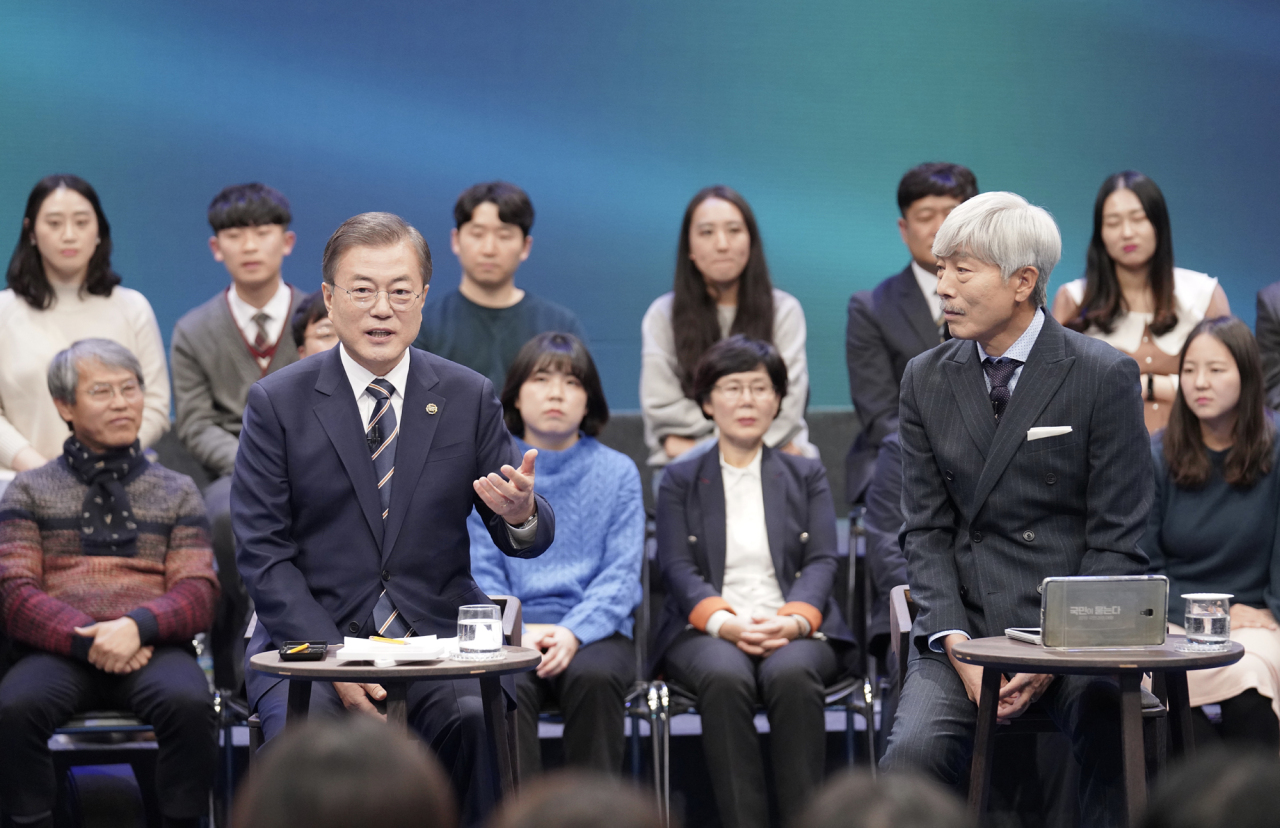President Moon Jae-in’s television appearance on Tuesday is being met with mixed reactions from the public and political arena.
On Tuesday, Moon took part in an unscripted question-and-answer session televised live on major terrestrial and cable networks. The program invited 300 members of the public -- selected to represent South Korea’s demographics -- to pose any question to the president.
 |
President Moon Jae-in speaks during the televised meeting on Tuesday. Yonhap |
Although the program gave members of the public a chance to address the president directly, its format led to the questions being asked in a disorderly manner. Furthermore, some questions were longer than the president’s answers, while others seemed more like expressions of personal opinions than questions.
The main opposition Liberty Korea Party called the event a “show for delivering content prepared by Cheong Wa Dae.”
“Three hundred members of the public were invited, and (the president) only took questions from about 20, and even those had to listen to the president’s lengthy response to specific questions,” Liberty Korea Party spokesperson Rep. Kim Myung-yeon said.
Kim honed in on the president’s response to North Korea-related questions, saying the program forced the public to listen to Moon’s views on “hollow peace.”
Regarding North Korean issues, Moon said that inter-Korean and US-North Korea relations may appear to be slow now compared to the rapid pace of related developments in the months following last year’s PyeongChang Olympics.
Saying he personally feels that North Korea-related developments have been worthwhile, Moon said that efforts are underway to keep US-North Korea dialogue going.
Inter-Korean relations are limited by the stance of the US and the international community, said the president.
“If it were just the two Koreas, (improving relations) could be faster, but (Seoul) must keep in step with the international society and our allies, the US, with regards to inter-Korean relations,” Moon said. He added that efforts are being made to arrange working-level talks within the year and another US-North Korea summit.
“If a third North Korea-US summit is held, there will be results, and then there will be room for (improving) inter-Korean relations.”
Meanwhile, the minor conservative opposition Bareunmirae Party echoed the main opposition, saying the program only received the usual questions and that the president praised himself while blaming others for the shortcomings of his administration.
The party derided the nearly two-hour program as a “waste of time and waste of airwaves.”
In contrast, the ruling Democratic Party praised the event, saying it allowed the people’s voices to be heard by not only the president but also the government, National Assembly and the general public.
While assessing the event as a success, Cheong Wa Dae also admitted to the shortcomings of the program.
Speaking on a radio program on Wednesday, Cheong Wa Dae spokesperson Ko Min-jung said that presidential staff had concerns that the program would become chaotic at times when members of the audience shouted questions over the host and one another.
Ko, however, said the program was a success, as it allowed the president to be heard in a format in which questions and answers were not prearranged.
By Choi He-suk (
cheesuk@heraldcorp.com)







![[Today’s K-pop] Blackpink’s Jennie, Lisa invited to Coachella as solo acts](http://res.heraldm.com/phpwas/restmb_idxmake.php?idx=644&simg=/content/image/2024/11/21/20241121050099_0.jpg)
